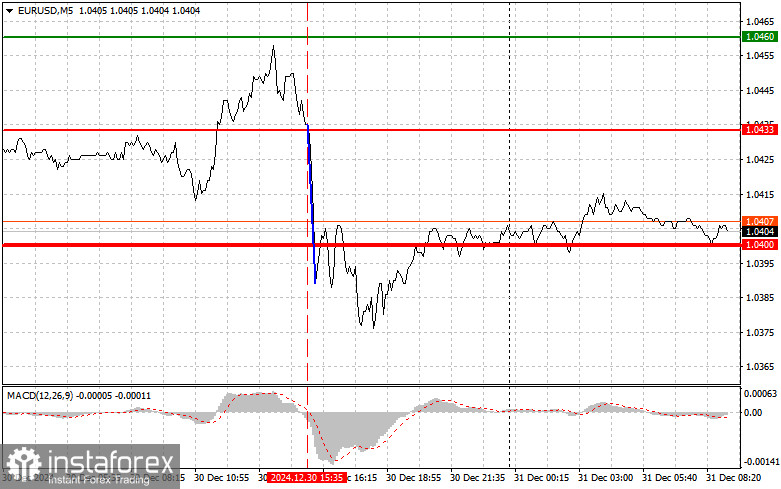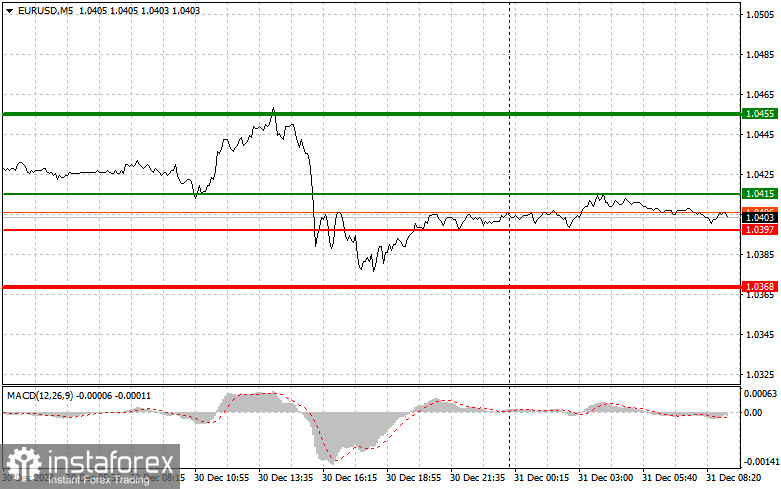Analysis of Trades and Trading Tips for the Euro
The test of the 1.0433 price level occurred at a time when the MACD indicator was just starting to move downward from the zero mark, confirming a valid market entry point. As a result, the pair dropped by 30 points, reaching the target level of 1.0400.
Today is December 31, and there are no significant statistics from the Eurozone, so the first half of the day is likely to unfold within a sideways channel. Given the low volatility and compressed price ranges, extra caution is required. Market participants are likely to hold their positions until the new year. Additionally, the upcoming New Year can influence investor sentiment, with many preferring to close the year with clean accounts, thereby limiting trading activity. Consequently, the sideways channel could persist, and traders should be prepared for the possibility of sharp trend changes after the holidays.
For the intraday strategy, I will rely more on Scenario #2.

Buy Scenarios
Scenario #1: Today, buying the euro is possible upon reaching the 1.0415 price level (green line on the chart) with a target of 1.0455. At 1.0455, I plan to exit the market and open short positions in the opposite direction, aiming for a 30–35 point move from the entry point. Expecting significant euro growth today in the first half of the day is unlikely. Important! Before buying, ensure that the MACD indicator is above the zero mark and just starting to rise from it.
Scenario #2: Another buying opportunity arises if the price tests 1.0397 twice, with the MACD indicator in the oversold zone. This would limit the pair's downward potential and lead to a market reversal upward. Growth can be expected toward the opposite levels of 1.0415 and 1.0455.
Sell Scenarios
Scenario #1: I plan to sell the euro after reaching the 1.0397 level (red line on the chart), targeting 1.0368, where I will exit the market and immediately open long positions in the opposite direction (anticipating a 20–25 point move in reverse). Pressure on the pair is also likely to remain limited. Important! Before selling, ensure that the MACD indicator is below the zero mark and just starting to decline from it.
Scenario #2: Another selling opportunity arises if the price tests 1.0415 twice, with the MACD indicator in the overbought zone. This would limit the pair's upward potential and lead to a market reversal downward. A decline toward the opposite levels of 1.0397 and 1.0368 can be expected.

What's on the chart:
- Thin Green Line: The price level at which the instrument can be bought.
- Thick Green Line: The assumed price level where Take Profit orders can be set, or profits can be manually secured, as further growth above this level is unlikely.
- Thin Red Line: The price level at which the instrument can be sold.
- Thick Red Line: The assumed price level where Take Profit orders can be set, or profits can be manually secured, as further decline below this level is unlikely.
- MACD Indicator: When entering the market, pay attention to overbought and oversold zones.
Important Notes
Beginner forex traders should make market entry decisions cautiously. Before major fundamental reports are released, it is advisable to stay out of the market to avoid sharp price fluctuations. If trading during news releases, always set stop-loss orders to minimize losses. Without stop-loss orders, you can quickly lose your entire deposit, especially when trading in large volumes.
Remember, successful trading requires a clear trading plan, such as the one outlined above. Spontaneous trading decisions based on current market situations are inherently a losing strategy for intraday traders.
 English
English 
 Русский
Русский Bahasa Indonesia
Bahasa Indonesia Bahasa Malay
Bahasa Malay ไทย
ไทย Español
Español Deutsch
Deutsch Български
Български Français
Français Tiếng Việt
Tiếng Việt 中文
中文 বাংলা
বাংলা हिन्दी
हिन्दी Čeština
Čeština Українська
Українська Română
Română

